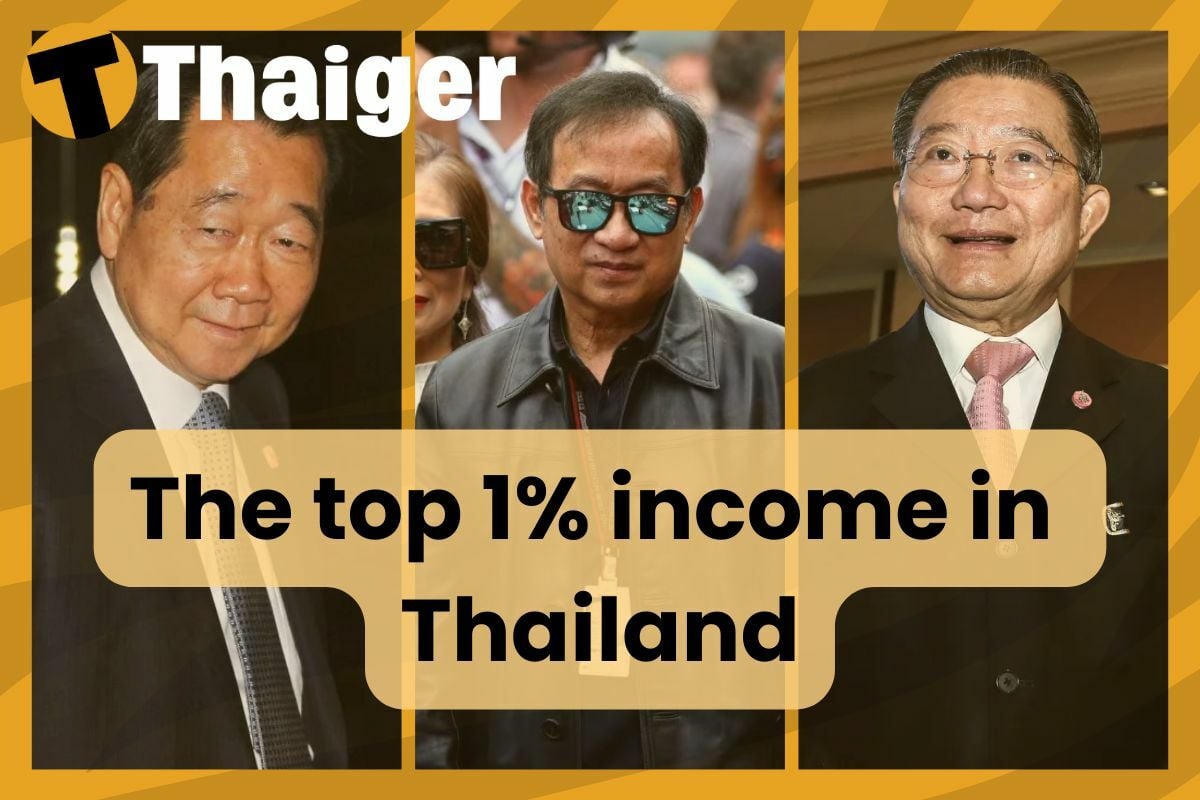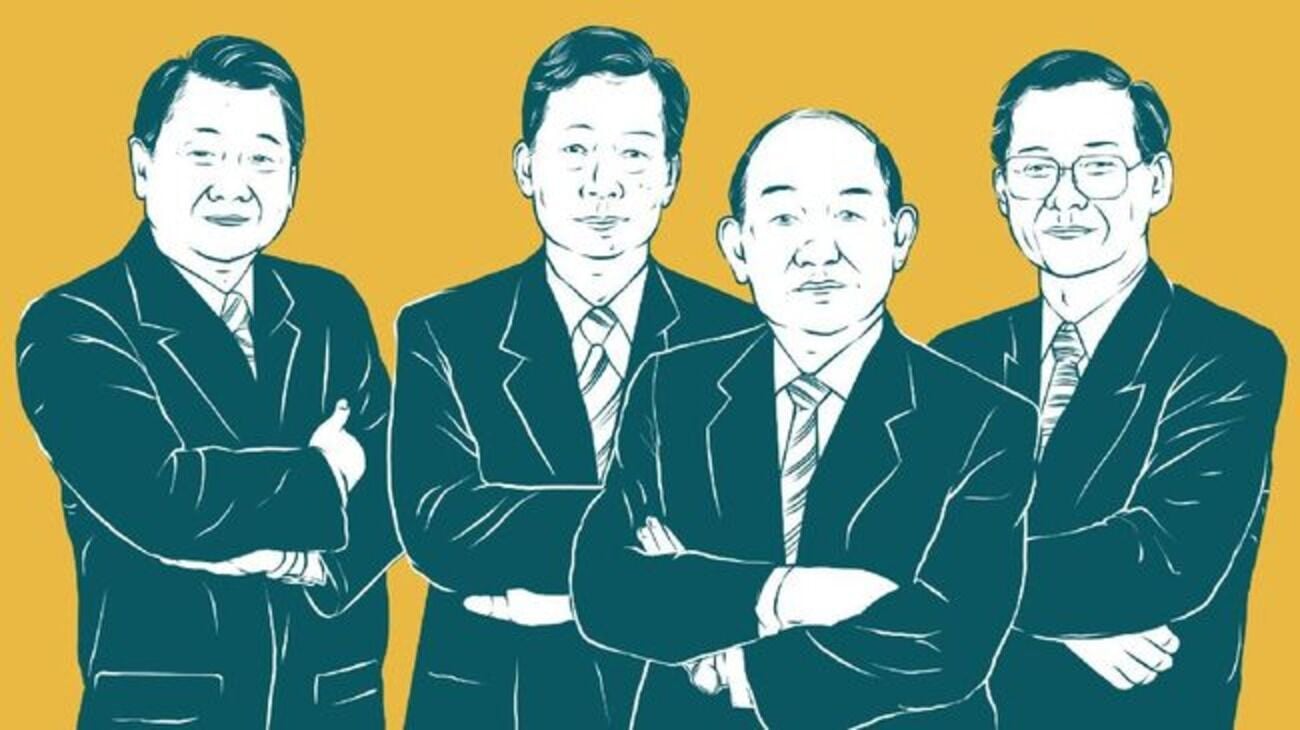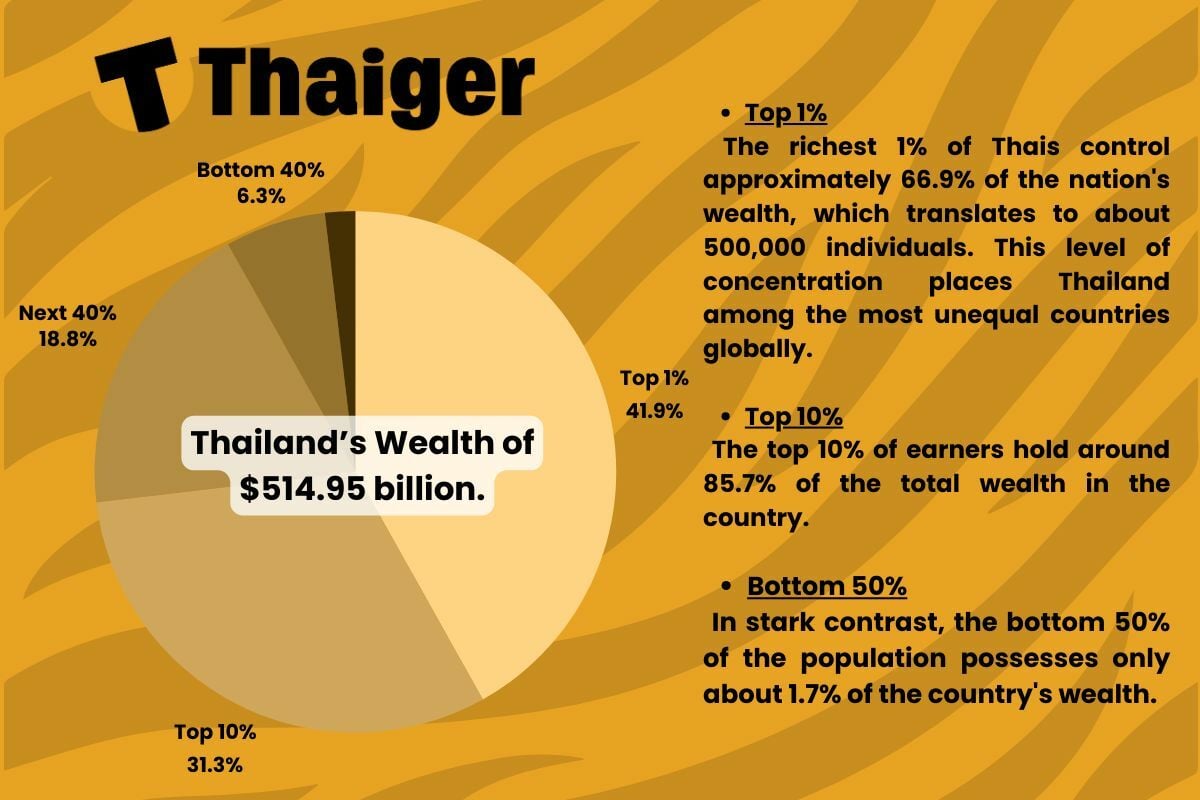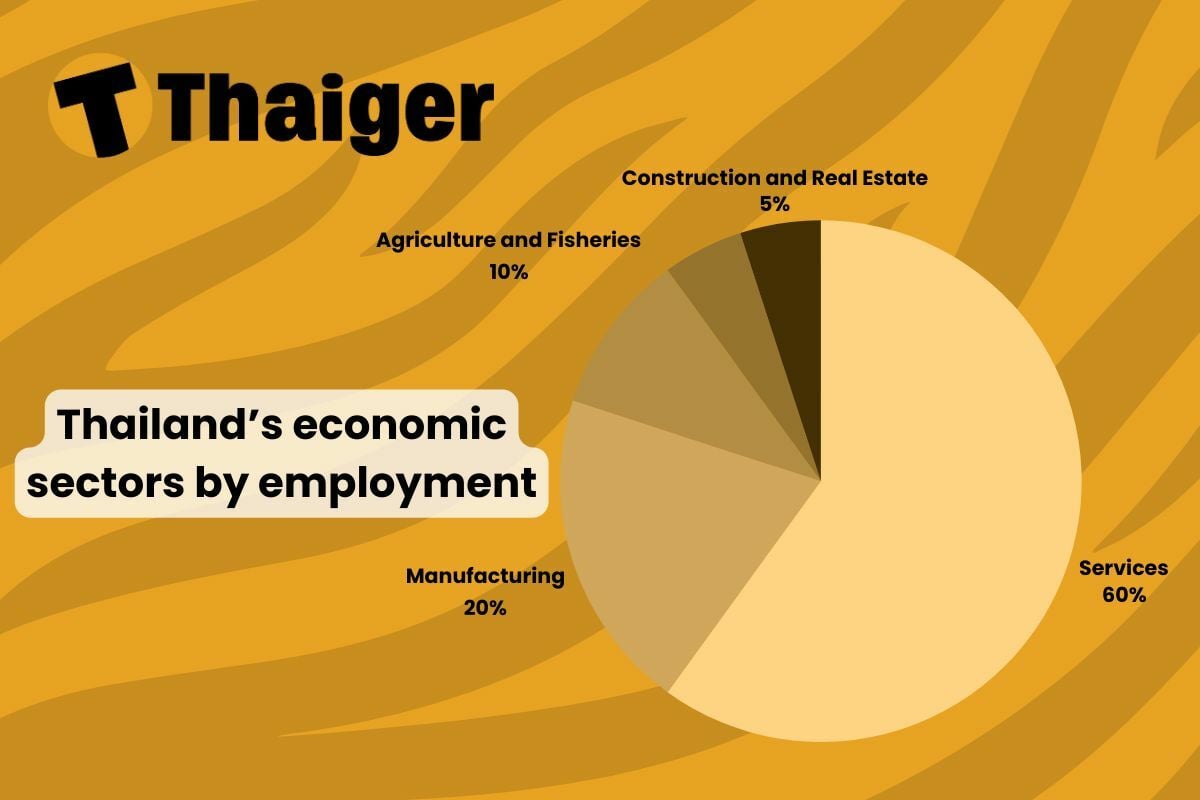The income of the top 1% in Thailand

While many Westerners associate Asian wealth primarily with countries like Singapore and Japan, Thailand has its own population of Hi-So “ultra-wealthy individuals”. The country’s wealth distribution reveals that while not considered a rich nation overall, Thailand has a notable number of individuals in the top 1% income bracket.
Reaching the top 1% of income in European countries typically requires a mix of hard work and fortunate circumstances. However, the question still remains what level of wealth defines this exclusive 1% income bracket?

What income is in the top 1% in Thailand?
The Land of Smiles, Thailand is the 29th-largest economy globally and the second-largest economy in ASEAN. Tourism drives the country’s economic activity, and Thailand is also a major global rubber exporter.
The top 1% of income in Thailand which is approximately 500,000 people. Although not confirmed officially, multiple sources state that to be the top 1% earner in Thai you need an income of around 380k bahts or 250k bahts per month. This translates to an impressive 1 million baht every four months. Even more impressive is that this elite group of top 1% account for 21% of Thailand’s national income annually.
The top players driving wealth for the top 1%
Thailand’s biggest money makers are crushing it in real estate, finance and banking, manufacturing, and tourism. These powerhouse industries aren’t just boosting the economy, they’re behind the top 1% of income in Thailand. These are the top 3 players in the Thai economy.

Chalerm Yoovidhya & family
The Yoovidhya family, led by Chaleo Yoovidhya, co-founder of Red Bull, holds a 51% stake in the company. After successfully resolving a trademark dispute with Red Bull China in 2020, the company continued to thrive even following the death of Austrian co-founder Dietrich Mateschitz in 2022. The company traces its roots to Chalerm’s late father, Chaleo, who helped transform a local Thai energy drink into a global powerhouse.

Chearavanont brothers
The story of CP Group started from a humble seed shop in 1921, founded by siblings Chia Ek Chor and Choncharoen Chiaravanont, it grew into a global giant in animal feed and livestock. The empire is now run by four family branches, with Dhanin Chearavanont still holding strong as senior chairman after stepping down in 2017. Talk about keeping it in the family – Dhanin’s sons Soopakij and Suphachai now run the show as chairman and CEO. In 2023, they added another win to their belt when their telecom unit True merged with Total Access Communications.

Charoen Sirivadhanabhakdi
From street vendor’s kids to beverage industry giants. Charoen Sirivadhanabhakdi is a self-made mogul who runs Thai Beverage and 7 Eleven Thailand, the powerhouse behind Chang Beer and isn’t stopping there. He’s built an empire spanning from Singapore’s Fraser & Neave to Thailand’s Big C Supercenter. Which he bought for a whopping $6 billion. In 2019, he took his property company Asset World public, keeping most shares for himself. Now his son Panote is following dad’s footsteps, heading up the massive $4 billion One Bangkok project.
Thailand’s wealth distribution
The wealth concentration in Thailand surpasses even major economies like Russia and India. The numbers show the top 10% of earners taking up an astounding 85.7% of the nation’s total wealth, while the bottom half of the population holds just 1.7%.
This difference becomes even more apparent when compared to developed nations. In Belgium, the top 1% controls 20.1% of the national wealth. Here is a pie chart of the wealth distribution in Thailand to give a better perspective,

Typical jobs for the top 1%
How did they get in that position? To earn that much money in the Thai competitive economy, a typical job for the top 1% consists of CEO, investor, lawyer and high board of director positions.
According to Open Development Thai, 67% of all the nation’s wealth is controlled by the top 1%, resulting in the remainder being shared among the rest of the population. Although the wealth distribution is not as severe as in some nations. Thailand is still considered to have an unequal wealth distribution.
To reach Thailand’s top 1%, two main routes are common: individuals must be highly professional in their own specific careers or must come from wealthy families. These roles demand extensive expertise, connections, and often years of strategic career development. Jobs that are commonly associated with this wealth bracket include:
- CEOs
- Successful investors
- High-profile lawyers
- Corporate board directors.
While some countries face even greater wealth disparities, Thailand’s wealth distribution remains significantly uneven by international standards.

What is considered a good salary in Thailand?
How much do you need to earn to live comfortably in Thailand, well that depends on your lifestyle of course. But a typical average household that earns an average salary in Thailand can live a comfortable lifestyle. It is less expensive, particularly in regions outside of Bangkok.
However, it is considered a good salary if the salary is 100k per month. This is often viewed as a threshold for a wealthy lifestyle in urban areas like Bangkok. This level of income allows for luxury living, including high-end housing, dining, and leisure activities. In terms of net worth, it is considered that individuals need assets exceeding 10 million baht. This can include property, investments, and savings.
Average Thai salary
An average Thai individual gets an average of 15,000 baht according to Expatica. Although the number may be a rough estimate as each province’s average varies.
| Area | Average salary for Thai |
| Bangkok | 19k – 30k |
| Chaing Mai | 14k – 15k |
| Phuket | 14k – 15k |
| Northeast Thailand (e.g., Isaan region) | 14k – 15k |
*The table above is sourced from Thailand Know How (Source)
Bangkok & Phuket remain the highest-paying region due to its urbanisation and economic opportunities. While provinces like Chiang Mai and those in the Northeast show lower average salaries according to their respective economic activities and living costs.
Average expats salary
While expats may face certain limitations in the Thai job market compared to locals, several career paths stand out as it is suitable for foreign professionals. Professions like English teaching positions, digital nomad opportunities, NGO work, and even culinary roles for those with relevant experience. These positions typically offer salaries above the national average. However, it’s important to note that salary can vary significantly based on location – with major urban centres like Bangkok generally offering higher pay than provincial areas.
| Area | The average salary for expats |
| Bangkok | 60k – 120k |
| Chaing Mai | 30k – 80k |
| Phuket | 50k – 100k |
| Northeast Thailand (e.g., Isaan region) | 20k – 50k |
*The table above is sourced from Thailand Know How (Source)
While this article showcases the difference in wealth compared to the average. This should give you the typical demographic and additional information about the top 1% of the nation’s wealth. This analysis not only sheds light on wealth concentration but also pushes important conversations about financial equity and opportunities for social mobility in Thailand.
What income level qualifies an individual to be in Thailand's top 1%?
In Thailand, the top 1% income bracket comprises approximately 500,000 individuals who earn around 250,000 THB per month. This translates to an impressive 1 million baht every four months. Members of this elite group collectively command 21% of Thailand's national income annually, highlighting their significant influence on the country's economic landscape.
Is Thailand's wealth distribution more unequal compared to other nations?
Yes, Thailand exhibits a significantly unequal wealth distribution, even surpassing major economies like Russia and India in terms of wealth concentration. In Thailand:
The top 1% control 67% of the nation's total wealth.
The top 10% hold an astonishing 85.7% of the country's wealth.
The bottom 50% possess only 1.7% of the total wealth.
What are the primary industries that contribute to the wealth of Thailand's top 1%?
The wealth of Thailand's top 1% is primarily driven by the following industries:
Real Estate: Investing in property development and high-end real estate ventures.
Finance and Banking: Managing substantial assets and financial institutions.
Manufacturing: Leading major manufacturing enterprises, including animal feed and livestock through conglomerates like CP Group.
Tourism: Capitalising on Thailand's status as a major global tourist destination.
How Does Thailand's Wealth Distribution Compare to Other Countries?
Thailand has a highly unequal wealth distribution, with the top 1% holding a larger share of wealth at 85.7% as compared to many other countries, such as Belgium where the top 1% control about 20.1% of national wealth.
Is the Average Salary in Thailand High Compared to Other Countries?
No, the average monthly salary in Thailand is about 30,000 THB (approximately $900 USD), which is lower than in many developed countries like the United States, Germany, and Japan. However, Thailand's lower cost of living helps balance this difference, making the average salary more manageable for residents.
Latest Thailand News
Follow The Thaiger on Google News:


























